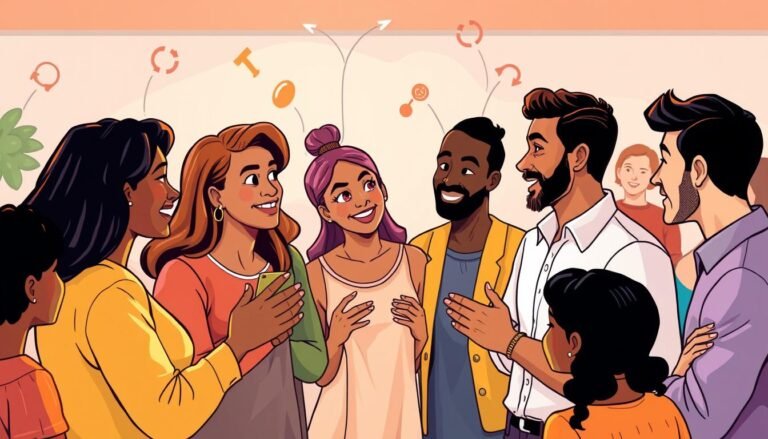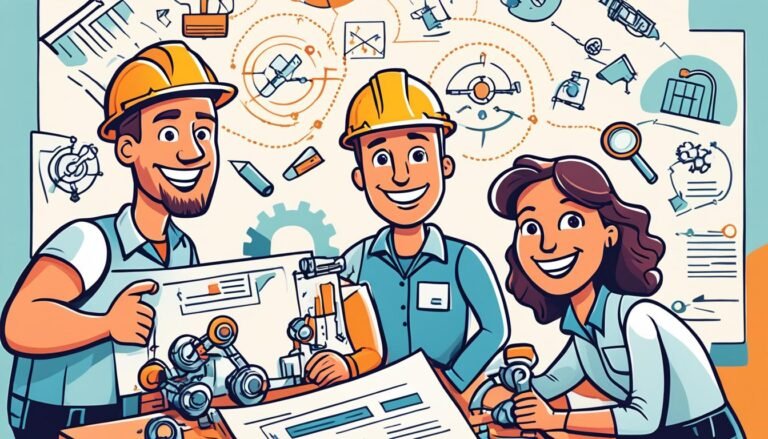Empathy as a Soft Skill
Understanding empathy as an essential skill is crucial. It's crucial for effective communication and building relationships. Empathy boosts teamwork success in personal and professional life. By acknowledging others' perspectives, you enhance collaboration and problem-solving. Strengthen bonds through active listening and showing compassion. The benefits of empathy extend beyond just communication skills.
Key Takeaways
- Empathy as a soft skill enhances communication and understanding.
- It fosters positive relationships in personal and professional settings.
- Empathy promotes teamwork, collaboration, and conflict resolution.
- It improves customer relations and boosts satisfaction and loyalty.
- Cultivating empathy leads to a more harmonious and empathetic work environment.
Importance of Empathy
Understanding the significance of empathy in the workplace is essential for fostering positive relationships and effective communication. Empathy plays an important role not only in education and healthcare but also in various professional settings.
In education, teachers who demonstrate empathy towards their students create a supportive learning environment where students feel understood and valued. This, in turn, enhances student engagement and overall academic performance.
Similarly, in healthcare, empathy is crucial for building trust and rapport with patients. Healthcare providers who show empathy towards their patients can improve patient satisfaction, adherence to treatment plans, and overall health outcomes.
Benefits in Communication
When you practice empathy in communication, you can enhance your understanding of others' perspectives, leading to more effective interactions.
By demonstrating empathy, you can build stronger connections and trust with those you communicate with.
Empathy in communication can pave the way for smoother conversations and improved relationships.
Improved Understanding Through Empathy
By practicing empathy in your communication, you can enhance your understanding of others' perspectives and emotions, leading to more effective interactions.
Empathy plays a vital role in fostering innovation by allowing you to see things from different angles, sparking creativity and problem-solving.
Cultural empathy skills enable you to navigate diverse environments with sensitivity and respect, fostering trust and collaboration.
When you actively listen and empathize with others, you create a safe space for open dialogue and mutual understanding.
This improved understanding through empathy not only enhances your communication skills but also boosts your ability to connect with individuals from various backgrounds.
Embracing empathy in your interactions can lead to more meaningful and productive relationships, both personally and professionally.
Strengthened Relationships With Empathy
How can empathy in communication benefit your relationships and enhance your interactions?
Empathy plays an essential role in fostering stronger connections, whether in friendships or partnerships. By actively listening and understanding the emotions of others, you can create a supportive environment where individuals feel valued and respected.
In friendships, empathy allows you to provide comfort during challenging times and celebrate victories together, deepening the bond you share.
Similarly, in partnerships, empathy enhances communication by promoting trust and mutual understanding, leading to more effective collaboration and problem-solving.
Developing empathy in your communication skills can lead to more meaningful and harmonious relationships, ultimately enriching your personal and professional life.
Enhancing Team Collaboration
Enhancing team collaboration is vital for achieving peak results in any project or task. Effective collaboration involves understanding team dynamics, problem-solving, and conflict resolution. By fostering a collaborative environment, teams can leverage each member's strengths, leading to innovative solutions and improved productivity.
To enhance team collaboration, it is essential to establish clear communication channels, set mutual goals, and promote a culture of trust and respect. Encouraging open dialogue and active listening can help prevent misunderstandings and promote a harmonious team dynamic. Additionally, providing opportunities for team members to share their ideas and perspectives can lead to more creative problem-solving approaches.
| Strategies for Enhancing Team Collaboration | Benefits |
|---|---|
| Establish clear communication channels | Prevent misunderstandings |
| Set mutual goals | Promote a harmonious team dynamic |
| Foster a culture of trust and respect | Improve productivity |
| Encourage open dialogue | Prevent conflicts |
| Provide opportunities for idea sharing | Promote creativity and innovation |
Empathy in Leadership
As a leader, incorporating empathy into your interactions with your team can foster trust and loyalty. Understanding your team members' perspectives and emotions can lead to more informed decision-making processes.
Leading With Empathy
Discover the power of leading with empathy in driving team success and fostering a positive work culture.
Empathy in management involves understanding your team members' perspectives, feelings, and motivations to effectively support their growth and well-being. By acknowledging and validating their emotions, you create a more inclusive and supportive work environment, leading to increased employee satisfaction and productivity.
Additionally, empathy in negotiation allows you to comprehend the needs and concerns of all parties involved, facilitating smoother discussions and better outcomes.
When you lead with empathy, you build trust, strengthen relationships, and inspire loyalty among your team members. Ultimately, incorporating empathy into your leadership style can enhance collaboration, communication, and overall team performance.
Empathy in Decision-Making
In leadership, incorporating empathy into decision-making processes can lead to more thoughtful and impactful outcomes for your team. Empathy in problem solving allows you to understand and address the root causes of issues, leading to more effective solutions. When negotiating with team members, empathy helps in recognizing their perspectives and concerns, fostering trust and collaboration.
| Empathy in Problem Solving | Empathy in Negotiations |
|---|---|
| Helps understand the underlying issues | Recognizes perspectives and concerns |
| Encourages a holistic approach | Builds trust and rapport |
| Leads to more effective solutions | Facilitates collaboration |
| Enhances team dynamics | Promotes win-win outcomes |
| Improves decision-making | Strengthens relationships |
Empathy in Conflict Resolution
Utilizing empathy as an essential tool in conflict resolution can foster understanding and facilitate constructive dialogue among conflicting parties. In mediation and conflict resolution processes, empathy plays an important role in helping individuals see things from the perspective of others, leading to more effective resolutions. Empathy training is becoming increasingly popular in workplace dynamics to equip employees and leaders with the skills needed to navigate conflicts successfully.
Empathy in conflict resolution involves actively listening to the concerns and emotions of all parties involved. By demonstrating empathy, individuals can create a safe space for open communication, which is essential for resolving conflicts. Acknowledging the emotions and perspectives of others can help de-escalate tense situations and build trust among conflicting parties.
Moreover, empathy can aid in uncovering underlying issues that may be fueling the conflict, allowing for targeted solutions that address the root cause of disagreements. By promoting empathy in conflict resolution, organizations can create a more harmonious work environment and foster stronger relationships among team members.
Empathy in Customer Relations
Empathy plays a crucial role in fostering positive relationships and enhancing customer satisfaction in today's competitive business landscape. Customer satisfaction is directly linked to the ability of businesses to understand and connect with their customers on an emotional level. Empathy training is becoming increasingly popular in the corporate world as companies recognize the importance of emotional intelligence in customer relations. By developing empathy skills, employees can better understand customer needs, concerns, and emotions, leading to improved satisfaction levels and stronger loyalty.
Emotional intelligence, which includes empathy as a core component, can be honed through various methods such as empathy workshops. These workshops provide employees with practical strategies to enhance their ability to empathize with customers, leading to more meaningful interactions and better problem-solving. Ultimately, businesses that prioritize empathy in their customer relations strategies are more likely to build long-lasting relationships with their clientele and achieve higher levels of customer satisfaction.
Cultivating Empathy in Workplaces
Cultivating empathy within workplaces fosters a more collaborative and understanding environment among team members. One effective way to promote empathy in the workplace is through empathy training and workshops. These initiatives help employees develop a deeper understanding of their colleagues' perspectives, leading to improved communication, stronger relationships, and a more positive work culture.
| Benefits of Empathy Training in Workplaces | |
|---|---|
| 1. Enhanced Communication | Empathy training teaches active listening and understanding non-verbal cues. |
| 2. Conflict Resolution | Employees learn to see situations from others' viewpoints, leading to more effective conflict resolution. |
| 3. Team Cohesion | Understanding colleagues' emotions and motivations fosters a sense of unity and collaboration. |
| 4. Improved Leadership | Empathetic leaders inspire trust and create a supportive work environment. |
| 5. Increased Employee Satisfaction | Feeling understood and valued boosts morale and job satisfaction. |
Empathy in Personal Relationships
To build strong personal connections, understanding and considering the feelings of others is essential in fostering healthy relationships. Empathy plays a critical role in both friendships and family dynamics. In friendships, being empathetic means being able to put yourself in your friend's shoes, understanding their emotions, and providing support when needed. It involves actively listening, showing compassion, and being there in times of joy and sorrow. By empathizing with your friends, you can strengthen your bond and create a safe space for open communication.
Within family dynamics, empathy is equally important. It involves being attuned to the emotions of family members, acknowledging their perspectives, and validating their feelings. Empathy in families fosters understanding, trust, and a sense of belonging. It helps in resolving conflicts peacefully, improving communication, and creating a harmonious environment. By practicing empathy in both friendships and family relationships, you can cultivate deeper connections, enhance emotional intimacy, and promote overall well-being within these important spheres of your life.
Empathy in Self-Reflection
Understanding your own emotions and how they impact your thoughts and actions is key to practicing empathy in self-reflection. Developing self-awareness and emotional intelligence allows you to connect with others on a deeper level and respond to their needs effectively.
Here are some ways to enhance empathy through self-reflection:
- Identify your emotions: Take time to recognize and label your feelings accurately.
- Reflect on past experiences: Consider how previous situations have influenced your emotional responses.
- Practice mindfulness: Engage in activities that help you stay present and attentive to your emotions.
- Seek feedback: Ask trusted individuals for their perspective on how you handle emotions.
- Set boundaries: Establish limits to protect your emotional well-being and prevent burnout.
Conclusion
As you navigate the waters of the professional world, remember that empathy isn't just a soft skill, but a powerful tool that can open doors, bridge gaps, and foster meaningful connections.
Like a beacon of light in a dark tunnel, empathy guides you through the complexities of communication, teamwork, leadership, and conflict resolution.
Cultivate this skill in your workplace and personal relationships, and watch as understanding and compassion illuminate your path to success.








